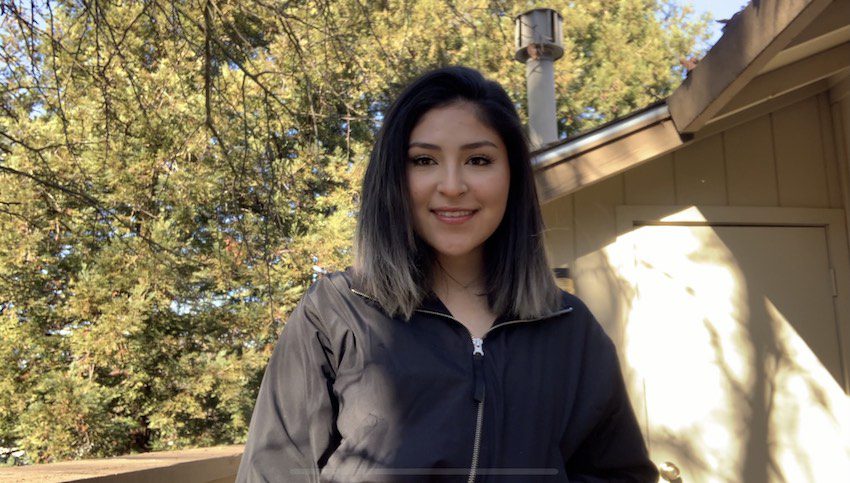 (Photo courtesy of Gladis)
(Photo courtesy of Gladis)
For many young adults, the new Biden administration represents more than a historic moment with a woman of color as vice president. It means the possibility of becoming legal. Thats’s the case for 18-year-old Gladis, who asked that we use her first name to protect her privacy. Gladis is currently a freshman in college studying sociology with the goal of becoming a lawyer. She and her family fled Mexico in search of opportunity and safety.
Like many undocumented students, she didn’t qualify for DACA, Deferred Action for Childhood Arrivals, a program that allows some individuals to apply for a temporary legal status and become eligible for a work permit in the United States. To be eligible for the program, there are many requirements, including living continuously “in the United States since June 15, 2007, up to the present time” and being “physically present in the United States on June 15, 2012” which was not the case for Gladis. She arrived in the U.S. in 2015, making her ineligible for the program.
During his first day on the job, President Biden signed 17 executive orders, one included protecting and preserving DACA. Biden also sent a bill to Congress outlining immigration reform which would provide a pathway to citizenship. If passed, this reform would ultimately change Gladis’ life forever. YR Media’s Denise Tejada sat down with Gladis to talk about how she has managed to remain positive after being told she didn’t qualify for DACA and what Biden’s proposed immigration reform would mean for her and her family.
This interview was edited for clarity and length.
—–
Denise Tejada: When did you realize that having a green card in this country was important?
Gladis: The moment that hit me the most was when I was looking for a job. I didn’t realize I needed [a green card]. I don’t think I realized how big of an impact it was … I was looking for jobs and nowhere could I ever find a job. I did not know that I needed a social security [number] to just get a job. And when I finally found a job, it was the most abusive job. It was controlling and unprofessional. Management was out of hand and I was treated very poorly. But I could not leave that place because I was getting paid without a social security [number], and that’s the moment that it hit me. This is what your life is going to look like, as an undocumented person living in America. No matter how much sh*t you face from other people, you cannot do anything because you are not represented in this country, you are not a person in this country, you are not valued in this country.
DT: How have you remained positive despite not being legal?
Gladis: I am telling you, I live off of hope, I don’t think I would be where I am if it wasn’t because of hope. I faced a lot of hardships. I developed anxiety and depression at the age of 13 and didn’t realize it. I went undiagnosed all throughout high school. And on top of that, I had to face language barriers; I had to face economic barriers and I remember the one day that I walked into my psychology class with my favorite teacher and I told them, “I am not going to college. I don’t want to go to college. I don’t want to keep suffering and going through what I am currently going through, but more on a college level.” He said, “Don’t give up because you never know what’s going to happen.”
I guess, as an immigrant all you really have is hope. Hope for better. Hope that one day maybe you will be valid. Hope that one day America will be a more humanitarian country and realize that we’re not all rapists and criminals.
DT: What would an immigration reform mean for you and your family?
Gladis: This [makes me] smile — just thinking about the possibilities of having a document that stands by me and my family. My family [includes] the most hard working people I have ever known. They work from sunset to sundown. My mom came to this country looking for a safe haven for us, her children. The one thing that made her hesitate to leave Mexico was her job. She had a career as a nurse. [A work permit] would just mean that she would finally work in the industry that she has worked so hard to be in.
She was the only child of seven that was able to finish a career, and it’s hard to see her in something that is not a nurse uniform. Having a green card would empower me so much. I love school and I want to be a lawyer. If I continue to live as an undocumented person in America and finish my sociology degree and hopefully my law degree, I would not be able to work in the United States. I would essentially have to move to a different country where I am welcomed.
DT: What was it like for you to watch Biden and Harris sworn into office?
Gladis: You know, I thought Biden would never be elected president. There was so much hate in this world, in this country, that I really didn’t think that love would win, but it did. Realizing that Trump wasn’t there anymore and that a woman of color was standing next to a president, a more humanitarian man, gave me the goosebumps. It made me feel calm, because even though the future is still uncertain, hate is no longer ruling. I didn’t realize how much fear I had, unconsciously, with Trump as president. I felt all that fear released when I saw [Biden and Harris] sworn in.